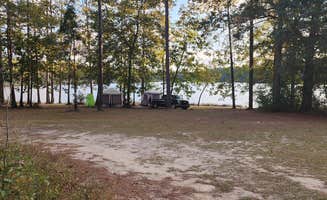Dispersed camping near Kinston, Alabama offers primitive options for campers seeking undeveloped sites in the southeastern corner of the state. The region is characterized by gently rolling pine forests interspersed with wetlands and small lakes, with summer temperatures averaging 90°F and high humidity levels. Winter camping provides milder conditions with nighttime temperatures typically ranging from 35-45°F, making it a viable year-round camping destination.
What to do
Fishing opportunities: Geneva State Lake provides two fishing docks and calm waters suitable for bank fishing or small watercraft. According to Vand H., "Beautiful park to camp next to the lake with 2 fishing docks. No bathrooms just port a potty. The camping price is $2 per night, no reservation is needed, and is online payment."
Wildlife observation: Early mornings at Geneva State Lake offer excellent opportunities for spotting local wildlife including deer, turkey, and numerous bird species. SJ W. notes, "I spent 2 nights sat/sun - and it was gorgeous especially for sunrise." Winter months provide clearer visibility through the thinned vegetation.
Hiking and exploration: The forest trails around Geneva State Lake accommodate various skill levels and extend beyond the immediate camping area. "There are 2 hiking trails - more like atv trails that go to either side of the lake from the campground. You can go further into the forest but it was deer hunting season so I didn't explore," reports one camper.
What campers like
Affordability: The low-cost camping options make the area accessible for budget-conscious travelers. The pricing structure at Geneva State Lake is particularly appealing, as noted by SJ W.: "$5 a day and there is a QR code on the board to pay, or you can by an annual pass for $40 if you plan on staying at least 9 days it's worth it."
Maintenance and cleanliness: Despite being primitive sites, campers frequently mention the well-maintained grounds. "It's a well maintained park and you can tell a lot of love has gone into it. Even had a ranger come through!" mentions one reviewer about Geneva State Lake.
Solitude and peacefulness: The remote nature of these camping areas provides a quiet experience away from developed campgrounds. SJ W. describes the experience: "It was so peaceful and the sunrises over the lake were breathtaking."
What you should know
Access considerations: Roads to dispersed camping areas can be challenging in inclement weather. One camper at Caryville Public Boat Ramp advises checking weather forecasts before arrival, especially during rainy seasons when dirt roads may become impassable for standard vehicles.
Hunting seasons: Be aware of hunting activity during deer season, typically October through January. Wear high-visibility clothing when hiking and be conscious of increased traffic on forest roads during these periods.
Limited amenities: Prepare for truly primitive conditions with no reliable cell service in most areas. Bring all necessary supplies including drinking water, toilet paper, and waste disposal bags. SJ W. mentions, "Wish I could have stayed longer but I didn't want to get stuck there in the rain - it was about 5 miles of dirt roads to get in there and they were well maintained but I didn't want to risk it."
Tips for camping with families
Site selection: Choose camping spots away from steep embankments near water features. Geneva State Lake offers sites of varying distance from the water, allowing families to select locations based on their comfort with water proximity and children's swimming abilities.
Wildlife awareness: Teach children proper food storage techniques to avoid attracting animals. All food should be secured in vehicles overnight, and garbage should never be left unattended.
Activity planning: Bring activities that don't require extensive setup or equipment. The natural setting provides opportunities for nature scavenger hunts, wildlife tracking, and stargazing on clear nights.
Tips from RVers
Site leveling: Many dispersed sites require significant leveling for RVs. One visitor to Geneva State Lake shares: "I drive a 20' van - so non level is ok for me but these sites were not level." Bring leveling blocks and chocks appropriate for your vehicle size.
Road reconnaissance: Consider scouting access roads before bringing large rigs to ensure clearance and navigability. This is especially important after rainfall when road conditions may deteriorate.
Resource management: Plan carefully for water and waste management with no hookups available. Most RVers report needing to be entirely self-contained for the duration of their stay, with no dumping facilities nearby.


